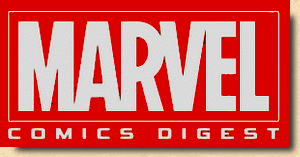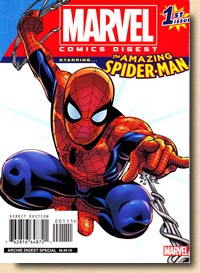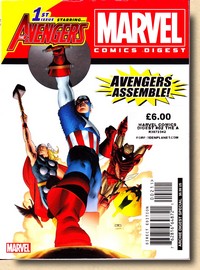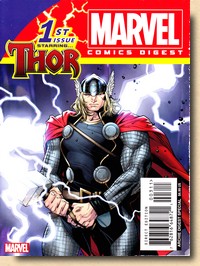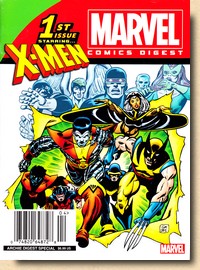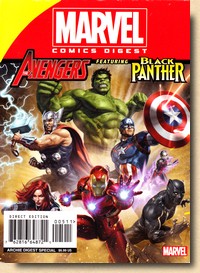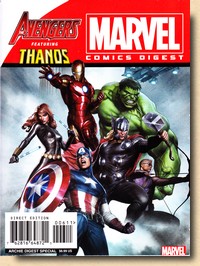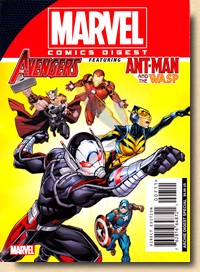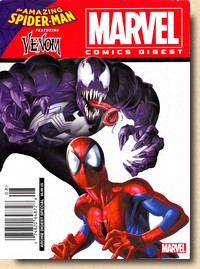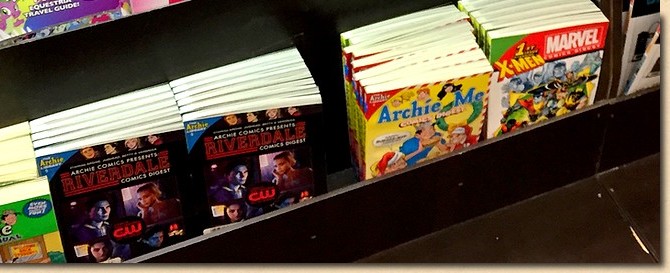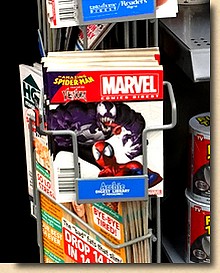|
| |
|
| |
| On February 16th
2017, Marvel Comics surprised the industry and comic book
readers alike by announcing that they would be teaming
with Archie Comics in order to produce a new series of
small format book collections called Marvel Comics
Digest, featuring the House of Idea's iconic
characters; the new publication was to be designed,
packaged and distributed to retailers by Archie Comics. |
| |
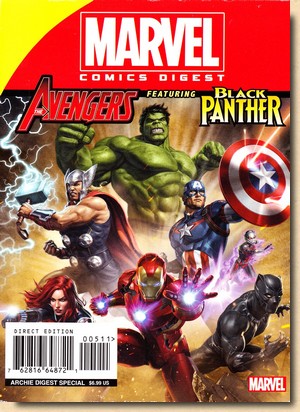
Marvel Comics
Digest #5
(January 2018) Direct Market Edition
|
|
"The
Archie Comics Digests have been a
popular bestselling format for Archie
Comics for decades. Archie Comics
will publish the new Marvel Comics
Digest six times a year beginning in
June 2017. The small format books
will be distributed to Big Box
retailers, comics shops and
newsstands by Archie Comics.
Marvel
senior v-p, sales and marketing David
Gabriel said teaming with Archie to
create and distribute the digests
will advance the “reach and
exposure” of the Marvel brand.
Gabriel said the digests offer
“our retailer partners, local
comic shops and large chain
retailers, a new, fun, and easily
digestible way to dive into the
Marvel Comics Universe and produce
life-long fans”.
Archie
Comics publisher and CEO Jon
Goldwater said the Archie Comics
Digests have been popular format with
consumers and retailers for many
years.
“For
years, Archie has made the digest
format our bread and butter,”
Goldwater said. “We are
supremely excited to spotlight iconic
characters like Spider-Man and the
Avengers through this major
partnership with Marvel. These books
will serve as a great introduction to
the Marvel Universe for new readers
and a very special, curated selection
of stories for existing fans.” (Marvel/Archie
joint press
release)
|
|
|
| |
| Marvel was thus clearly
turning to Archie Comics not only for its long
established expertise in releasing digest collections (a
format which Marvel has tried a few times in the past,
albeit with moderate success only) but also for Archie's
resilience in an area of retail which Marvel and most
other comic book publishers left a long time ago:
newsstands and supermarkets. |
| |
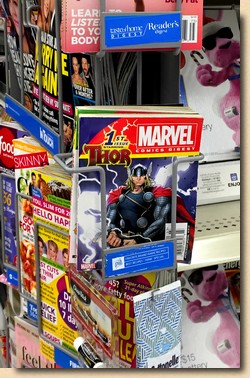 |
|
Archie
is, after all, one of the very few publishers who
never stopped selling their comics in this
difficult but potentially large market, giving
any partnering company a huge outreach to buyers
which, in this case, Marvel typically no longer
serves: the general public which doesn't shop at
or doesn't even have access to specialist comic
book stores. The
team-up promised to be a win-win deal for both
parties:
Marvel would get to
use Archie Comics’ already well-established
presence within a new market segment and thus get
to tap into it without much effort.
Archie on the other
hand would get the benefit of being able to put
out books with some of the most recognizable
characters and thus get a share in the profits
simply by reprinting archival material.
|
|
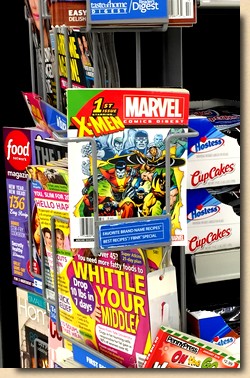 |
|
| |
Marvel Comics Digests on
display at Walmart (Lebanon Va, left / Claypole Hill Va,
right) and Books-A-Million (Bristol Va, below)
|
| |
 |
| |
| Distribution was not,
however, limited to the newsstand market as every
issue was also made available to specialist comic
stores. The only difference these "direct
market" editions displayed was a different
barcode together with the added wording DIRECT EDITION. The concept of the Marvel
Comics Digest, as hinted at in the press
release, was to provide the buyer with 200+ pages
of reprint material for a cover price of $6.99.
The contents of each issue would feature, as
Marvel put it in one of their house ads, "a
mixture of the most memorable classic and modern
stories, spanning every decade of Marvel history
and readership".
Both Archie and
Marvel were also keen to point out that every
issue of the Marvel Comics Digest was a "can’t-miss
collector’s item" and would not be
reprinted.
REVIEW &
ANALYSIS
|
|
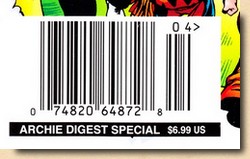 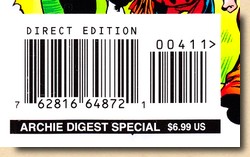
|
|
| |
| These days, any classic 1960s
and 1970s Marvel material is published on glossy
paper and often as hardcovers. The Marvel
Comics Digests however used newsstock paper
and were almost as flexible as a
"floppy" single issue, and although the
quality of the paper and the printing were way
above what they had been back in the days when
the material reprinted here was originally
published, the Marvel Comics Digests were
something of a throwback for seasoned comic book
readers in this respect. Printed in the USA,
production quality as a whole was good, although
in some cases the reprinted pages were not
centred well and thus moved precariously close to
the right or left hand margin of the pages; in
the latter case, this forced readers to spread
open their copy more than they would probably
want to (in view of the glued spine) in order to
be able to read everything.
In comparison to
Marvel's own digests (both the US Adventures
and UK Pocket Books editions) the Marvel
Comics Digests were around 20% smaller (even
if no issue of Marvel Comics Digest
seemed to be quite the same height). The
necessary reduction of the original page size in
order to fit the digest format dimensions was at
times also a bit forced, making reading slightly
difficult here and there and not being too kind
with the artwork.
|
|
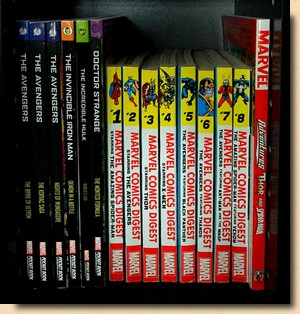 |
|
| |
| At first sight, the mix of
material from the 1960s through to the 2000s seemed like
a nice idea, providing the opportunity to sample
different styles of artwork and storytelling. However,
just by looking at the covers and splash pages of the
comic books reprinted in Marvel Comics Digest #2
one can clearly see that the differences were extremely
pronounced. |
| |
| |
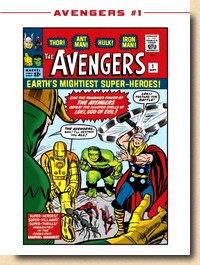
Avengers #1
(September 1963)
|
|
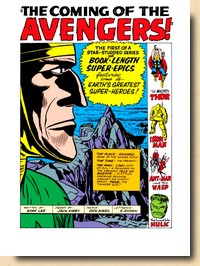
Avengers #1
(September 1963)
|
|
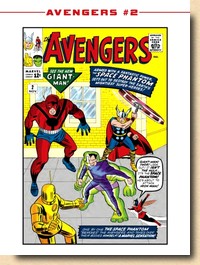
Avengers #2
(November 1963)
|
|
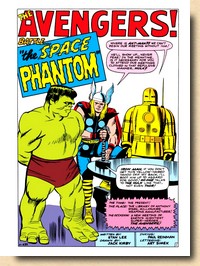
Avengers #2
(November 1963)
|
|
|
|
| |
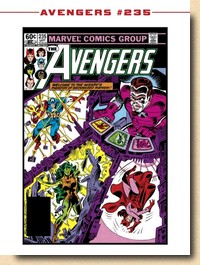
Avengers #235
(September 1983)
|
|
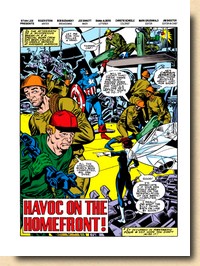
Avengers #235
(September 1983)
|
|
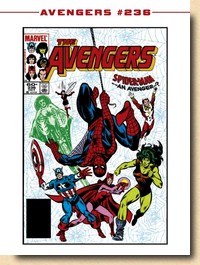
Avengers #236
(October 1983)
|
|
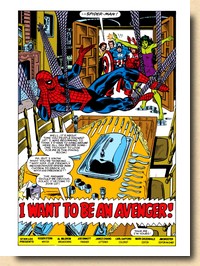
Avengers #236
(October 1983)
|
|
|
|
| |
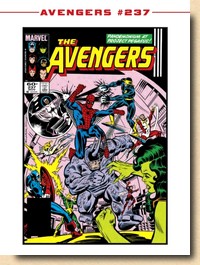
Avengers #237
(November 1983)
|
|
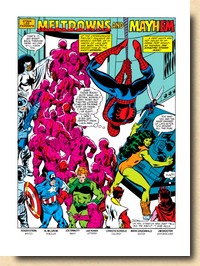
Avengers #237
(November 1983)
|
|
Very early
1963s material was followed by
still "classic
conventional" issues from
1983, from where a whirlwind
transported readers to the
"current/modern" style
of 2007, followed by three issues
from 2012/13 in what may best be
labelled "TV animation"
style. Combining
such diverse material is always a
challenge and may work in an
anthology, e.g. spanning "50
years of Spider-Man", but
combined in a bi-monthly
publication there is a high risk
that the glaring differences in
artwork and storytelling may be
prone to confuse or even irritate
readers more than they arouse
interest - especially as
newsstand buyers would be
presumed to have little or no
interest in comic book history at
all.
|
|
|
|
| |
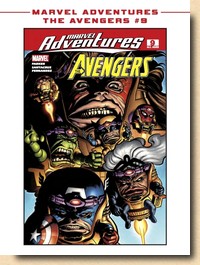
Marvel Adventures: Avengers #9
(March 2007)
|
|
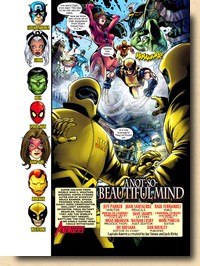
Marvel Adventures: Avengers #9
(March 2007)
|
|
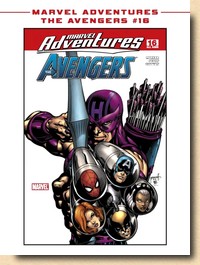
Marvel Adventures: Avengers #16
(November 2007)
|
|
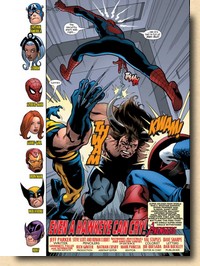
Marvel Adventures: Avengers #16
(November 2007)
|
|
|
|
| |
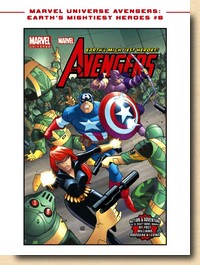
Marvel
Universe Avengers: Earth’s
Mightiest Heroes #6
(November 2012)
|
|
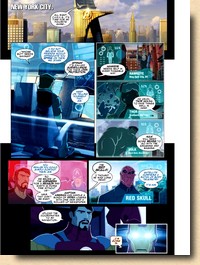
Marvel
Universe Avengers: Earth’s
Mightiest Heroes #6
(November 2012)
|
|
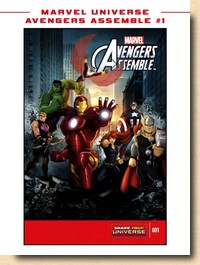
Marvel
Universe Avengers Assemble #1
(October 2013)
|
|

Marvel
Universe Avengers Assemble #1
(October 2013)
|
|
|
|
| |
| |
| All issues of Marvel
Comics Digest were built up around a central
character or group of superheroes, and the choices were
clearly made to tie in, whenever possible, with the
launch of a movie from the Marvel cinematic universe.
Whether or not this "works" in terms of
boosting sales of comic books is a debate amongst experts
in the field which does not seem to lead to a shared and
agreed upon conclusion. Someone who has pointed out for a
long time (through various podcasts and interviews) that
the game is about properties more than it is
about content is Martin Pasko. As DC's former
liaison to Warner Brothers Studios, Pasko knows the
business mechanics. As a seasoned comic book and pop
culture historian (and author of e.g. The DC Vault)
he has also often expressed his worries about just what
might be happening to the comic book industry.
"This year
[2013] at SDCC, when I took a closer look at [the
Marvel and DC] exhibits, and let my eye follow
carefully where that long line was snaking to, it
seemed as if more and more of those people were
queueing up for a chance to glimpse some
“teaser” footage from an upcoming movie or
TV show, and the lines to buy signed copies of Flavor
of the Week’s Superman or Smokin’ Hot
Newcomer’s Spider-Man were shorter. The
“brand” – the property – was what
was making the loudest ka-ching, ka-ching."
(Pasko, 2013)
And even though Variety
proclaimed that "comic book sales fly on the capes
of hit movies" in a July 2017 article, the
statements made by representatives of the industry were
somewhat more cautious:
“We don’t
march in lockstep with the studios, but whenever a
movie comes out it has a halo effect on us,”
notes Axel Alonso, editor-in-chief of Marvel Comics.
“Interest in that character will spike for two
to three months, and we always try to take advantage
of that and have something available for readers that
approximates the flavor.” As an example he cites
the new monthly book “Peter Parker: The
Spectacular Spider-Man,” launched in June with a
lighter, more humorous tone that aligns with the
ebullient spirit of “Spider-Man:
Homecoming,” which opened in early July." (Cox,
2017)
The movie mentioned by
Alonso (Spider-Man: Homecoming) was the wave of
interest and advertising on which Marvel Comics
Digest #1 rode out on, but whatever the "halo
effect" it may have profited from, the days are
certainly gone when comic book sales went through the
roof for more than just a few months (such as was the
case with the 1966/67 Batman TV show or the 1989 movie
featuring the same superhero).
|
| |
| No consolidated sales figures
are available for Marvel Comics Digest in
Archie's general public market, but the sales
figures reported for the direct edition issues
show less than spectacular numbers (based on the
information available at comichron.com). While the first issue sold
over 7,000 copies at comic book stores in the US,
sales dropped to just under 4,000 for issues #2
and #3. As of Marvel Comics Digest #4
the average number of issues shipped to
specialist retailers slid from 3,150 (issue #4)
to 2,550 (#5), 2,400 (#6) and finally 2,130 (#7,
seemingly the worst selling issue of Marvel
Comics Digest) before picking up again to
just under 3,000 for issue #8.
Quite obviously, the
characters' general pop culture status had little
influence on the sales; although Spider-Man's two
issues sold best (Marvel Comics Digest #1
and #8), the likes of the Avengers and X-Men
didn't impress quite the same way. The low sales
at comic book stores therefore clearly also had a
lot to do with low orders, based on the
less-than-expected success of the first two or
three issues.
|
|
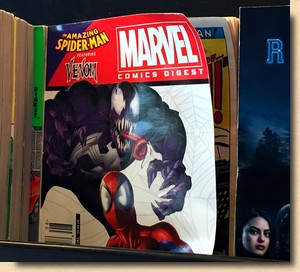
A tattered copy of Marvel
Comics Digest #8 on a shelf at Barnes & Noble
in Hoover, Alabama, is symbolic of the title's
cancellation in October 2018
|
|
| |
| Bottom line: most comic
book stores simply didn't deem Marvel Comics Digest
worth taking up their shelf space. Consequence: no orders
means no copies vailable to perusing buyers, and hence no
sales. A classic self-fulfilling prophecy. |
| |
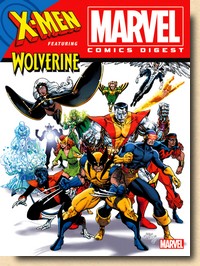 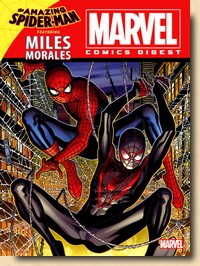
|
|
However, It is reasonable to
assume that the sales at supermarkets and in
large bookstores such as Books-A-Million and
Barnes & Noble were just as disappointing,
explaining why Archie and Marvel unceremoniously
pulled the plug in Mid-October 2018 even though
issues #9 (featuring Wolverine and the X-Men) and
#10 (featuring the Miles Morales version of
Spider-Man to tie in with the Spiderverse
animated movie) had already been solicitated and
most of the work on Marvel Comics Digest #9
had probably already been put together. In the end, sales were such
that it probably just wasn't worth the bother of
editing and compiling the reprint material and
then sending it to the printer and through the
distribution chain.
Which, all in all,
was a shame. The Marvel Comics Digest was
a nice little (no pun intended) idea, but it came
with a somewhat flawed concept formula; most
likely the title appealed to well-established
comic book readers more than it did to kids and
newcomers in supermarkets and bookstores. As
such, a little bit of tweaking (featuring more
1960s, 1970s and 1980s material and less or no
post-2000 material at all) could have turned it
into an established fan indulgment to coincide
with the by now frequent releases of Marvel
movies - but then such a concept would not have
warranted going through the newsstand market.
BIBLIOGRAPHY
COX Gordon
& Brian Steinberg (2017) "Comic Book Sales Fly
on the Capes of Hit Movies, TV Shows", Variety,
19 July 2017
MARVEL
ENTERTAINMENT (2017) "Marvel Teams with Archie
Comics to Release 'Marvel Comics Digest'", press release, 16
February 2017
|
|
| |
| PASKO
Martin (2013) "The Age of Michael
Jackson Comics'", published online at ComicM!x WHITBROOK James
(2017) "Archie Comics is going to start
releasing Marvel Comics, and that's not as weird as it
sounds", iO9,
16 February 2017
|
| |
 |
| |
| |



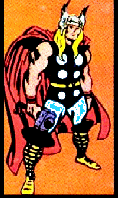
 SPOTLIGHT
ON ARCHIE'S
SPOTLIGHT
ON ARCHIE'S

























